Share
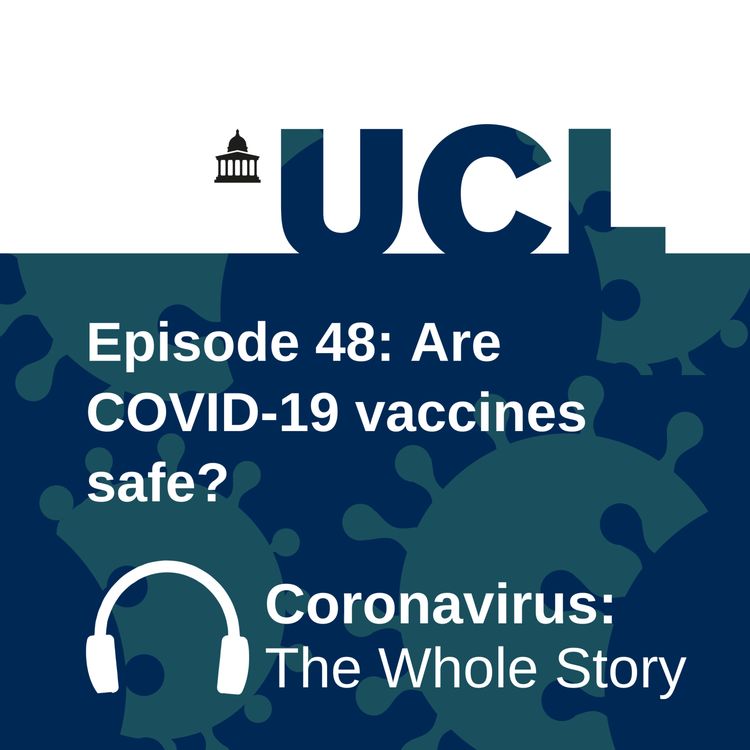
Coronavirus: The Whole Story
Are COVID-19 vaccines safe?
Ep. 48
•
Get the facts about COVID-19 vaccines.
With the recent news that under-40s are going to be offered an alternative to the Oxford-AstraZeneca vaccine, we speak to two UCL experts to explore the risks and benefits of coronavirus vaccines. How safe are vaccines? Do they cause blood clots? And how does this risk compare with other day-to-day activities? Listen to find out.
Transcript and more information on www.ucl.ac.uk/ucl-minds/podcasts…nscript-episode-48
More episodes
View all episodes
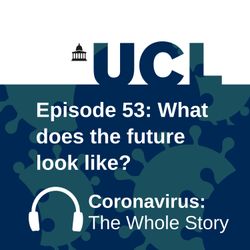
53. Coronavirus: The Whole Story - The Live Finale
39:09||Ep. 53Listen to the highlights of our series finale, recorded live on 21 July 2021. Hosted by UCL alumna, broadcaster and writer, Vivienne Parry OBE, our global audience put their questions to the experts.Guests:- Professor Dame Anne Johnson (Professor of Infectious Disease, Division of Infection & Immunity, UCL Faculty of Medical Sciences and Faculty of Population Health Sciences). Adviser to the SAGE committee.- Professor Deenan Pillay (Professor of Virology, Division of Infection & Immunity, UCL Faculty of Medical Sciences). Adviser to the Independent SAGE committee.- Professor Susan Michie (Professor of Health Psychology, Clinical, Educational & Health Psychology, Division of Psychology & Language Sciences, UCL Faculty of Brain Sciences). Adviser to the Sage and Independent SAGE committees.- Professor Andrew Hayward (Professor of Infectious Disease Epidemiology and Inclusion Health Research, UCL Institute of Epidemiology & Health). Adviser to the Sage and Nervtag committees.Find out more: www.ucl.ac.uk/ucl-minds/coronavirusView the transcript: www.ucl.ac.uk/ucl-minds/podcasts…nscript-episode-53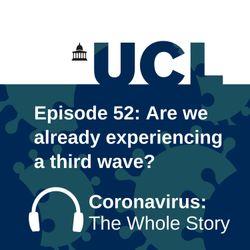
52. Are we already experiencing a third wave?
26:54||Ep. 52Today Vivienne Parry talks to Professor Francois Balloux (Chair in Computational Systems Biology and Chair of the UCL Genetics Institute) and Dr Keri Wong (Assistant Professor in Psychology in the Department of Psychology and Human Development at UCL IOE) about the lockdown extension, a potential third wave here in the UK and what this means for us mentally and physically.Transcript: www.ucl.ac.uk/ucl-minds/coronavirusUCL-Penn Global COVID Study - Webinar https://www.eventbrite.co.uk/e/lets-talk-what-do-you-need-to-recover-from-covid-19-webinar-5-of-5-tickets-153621318499With the end of lockdown in England in July, our Coronavirus: The Whole Story podcast is also coming to an end. Join us on Wednesday 21 July for the finale of Coronavirus: The Whole Story, a live panel event hosted by Vivienne Parry.Ask the experts directly in this very special finale to showcase the amazing work that has taken place across UCL. > http://bit.ly/CTWSlive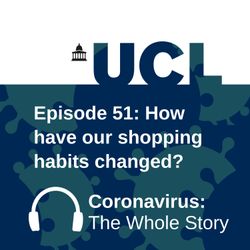
51. How have our shopping habits changed?
21:14||Ep. 51Lockdown is easing, the vaccination programme here in the UK is making steady progress, the sun is shining again, it almost feels as if the end is in sight. But what is the “normal” that we’re returning to going to look like?The pandemic has changed a lot of things about the way the world works and one area, in particular, is shopping. In this week’s episode, host Vivienne Parry speaks to entrepreneur Professor Tomas Chamorro-Premuzic (UCL Department of Clinical, Educational and Health Psychology) to understand how the pandemic has affected our shopping habits from delivery apps to online purchasing to the “death” of the highstreet.Transcript and more infor on www.ucl.ac.uk/ucl-minds/coronavirusTo hear more podcasts from UCL (University College London) visit https://www.ucl.ac.uk/ucl-minds/podcasts.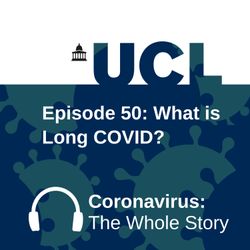
50. What is Long COVID?
28:47||Ep. 50Over a year on from the start of the pandemic, many people are still suffering complications after contracting coronavirus in the first wave. In our 50th episode, we explore the long-term physical and psychological effects of the virus by talking to two researchers about their groundbreaking work with “Long COVID”. Find out more about the symptoms of Long COVID, what to do if you think you have it, and what not to say to a Long COVID sufferer!Guests: Dr Alexandra Burton, Senior Research Fellow in Behavioural Science / Behaviour Change at the Institute of Epidemiology & Health, Faculty of Population Health SciencesDr Michael Zandi, Honorary Associate Professor in the UCL Queen Square Institute of Neurology Department of Neuromuscular DiseasesTranscript: https://www.ucl.ac.uk/ucl-minds/podcasts/coronavirus/transcript-episode-50Check out more UCL Podcasts on https://www.ucl.ac.uk/ucl-minds/podcasts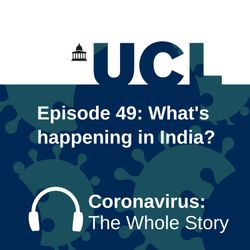
49. What's happening in India?
26:15||Ep. 49One thing that we have learned about coronavirus on this podcast is that it doesn’t affect everyone equally. Whilst the UK and US have been able to vaccinate over half their populations so far this year, the virus has been having a devastating impact in other parts of the world. Today we are going to be talking about the current crisis in India, their deadly second wave and what can be done to help.Join Vivienne Parry speak with two UCL experts, Dr Vageesh Jain (UCL Institute for Global Health) and Dr Shikta Das (UCL Cardiovascular Science).Access the transcript on https://www.ucl.ac.uk/ucl-minds/podcasts/coronavirus/transcript-episode-49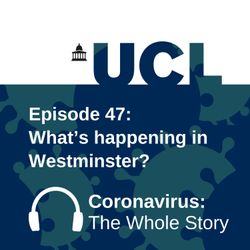
47. What's happening in Westminster?
33:10||Ep. 47This week marks one year since we launched our first episode of Coronavirus: The Whole Story - when we had no idea what challenges lay ahead of us. In today’s episode, we speak to three UCL experts to hear about how much has changed in that time, looking specifically at government and the law. What powers have been brought in to help enforce lockdown and tackle the virus? Have they been given the correct amount of scrutiny? And, how do they compare to other coronavirus laws created by other countries? Tune in to find out.Guests: Prof Meg Russell, Constitution Unit, UCL Political ScienceProf Jeff King, UCL LawsDr Melanie Smallman, Dept of Science and Technology StudiesRead more:Lex AtlasOxford Compendium of National Legal Responses to Covid-19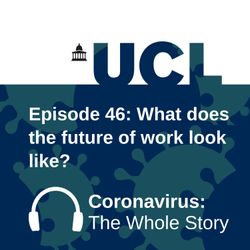
46. What does the future of work look like?
26:41||Ep. 46Coming out of lockdown doesn't mean returning to life as we knew it, especially in the world of work. So this week, we've brought together two UCL experts to talk us through the future of work, and how COVID-19 has the potential to change things for the better.Guests:- Prof Anna Cox (Professor & Vice Dean (Equality, Diversity & Inclusion) UCL Faculty of Brain Sciences- Dave Cook (PhD Candidate, UCL Anthropology)Transcript: www.ucl.ac.uk/ucl-minds/podcasts/coronavirus/transcript-episode-46Related UCL podcasts:- Disruptive Voices - AI and the Future of Work - https://www.ucl.ac.uk/grand-challenges/disruptive-voices- eWorkLife - https://www.eworklife.co.uk/podcast/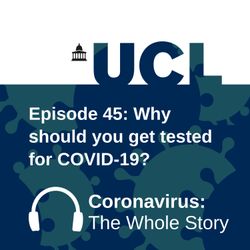
45. Why should you get tested for COVID-19?
25:37||Ep. 45How is testing helping us address the pandemic? Why is it still important? Could the light at the end of the tunnel that we now glimpse be genuine this time?Answers depend on the two pillars that underpin hope in the future - vaccines and testing. Host Vivienne Parry OBE is joined by guests who have been instrumental in testing programmes both here at UCL and across the country. We're going to be discussing the benefits of testing especially as the country is starting to reopen as well as the drawbacks.Special guests: Becky Whitham, Sian Minett, and Prof Irene PetersenMore information: www.ucl.ac.uk/ucl-minds/coronavirusTranscript: https://www.ucl.ac.uk/ucl-minds/podcasts/coronavirus/transcript-episode-45If you’ve got a question about the pandemic you’d like UCL researchers to answer, please get in touch by emailing UCL’s Communications and Marketing team on minds@ucl.ac.uk – we’d love to hear from you.